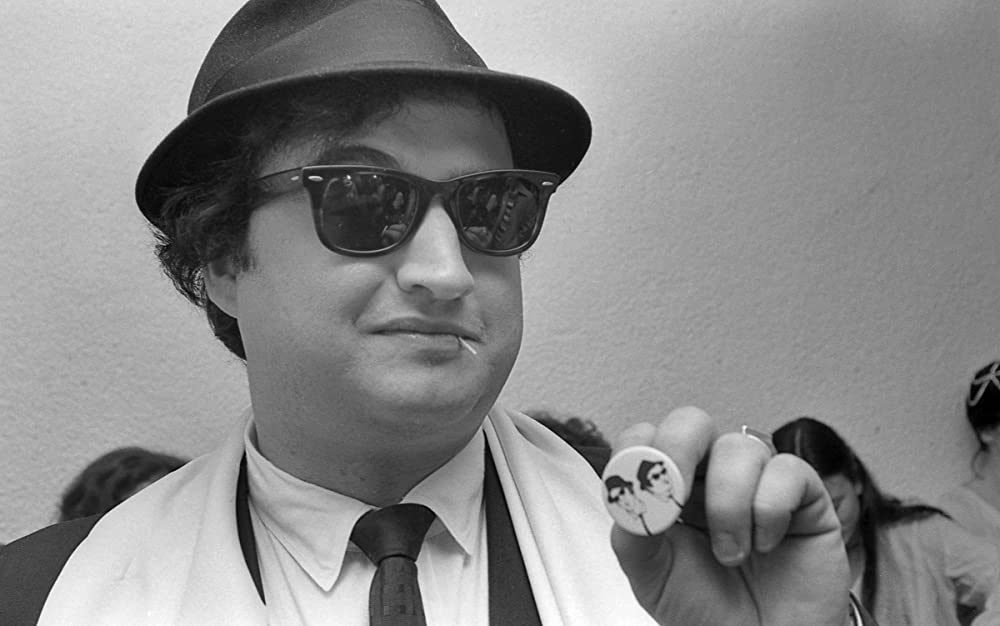
Belushi
2020, NR, 108 min. Directed by R.J. Cutler.
REVIEWED By Richard Whittaker, Fri., Nov. 27, 2020
John Belushi died a comedy great. From the moment he smashed into Second City, turning its fuddy-duddy intellectualism into a firestorm of creativity, through Saturday Night Live, Animal House, and The Blues Brothers, he was unmatched as a fourth-wall-busting, pratfalling, charming, effortlessly brilliant genius of laughter. What ate him up, as shown in R.J. Cutler's new documentary about the late performer, is that no one wanted to see him as anything else than that - a funny guy.
R.J. Cutler's Belushi (which arrives on Showtime this week) is a far more rounded look at the self-destructive comedy great than most of what we have seen before, melding archive footage, interviews recorded by Tanner Colby for his 2005 book Belushi: A Biography, and some Al Hirschfeld-influenced animation sequences to illustrate some of the wackier anecdotes and more personal moments
Fortunately, we're well past the hideousness of Wired: The Short Life and Fast Times of John Belushi, Bob Woodward's widely castigated and prurient biography (and the inexcusable movie adaptation), so the inevitable retelling of the whirlwind of drugs, anger, implosion, relapse, and raw genius is much more nuanced, much more compassionate. There's no attempt to drag a hackneyed link between his creativity and his combustibility, no "live fast, die young, leave a good looking corpse" narrative. Belushi was an astounding talent, Cutler argues, his seemingly anarchic style rooted in the rigorous discipline of forebears like Jonathan Winters and Bob Newhart. His addictions and excesses were simply another aspect of him. It wasn't coke that made his eyes twinkle behind those shades in The Blues Brothers: If anything, the moral here is like what William Burroughs said, that junkies can't write when they're strung out. Belushi's depression is the villain here, and his hopelessness after the double-failure of dramedy Continental Divide and bizarre black comedy Neighbors becomes an object lesson about how audiences want their icons to do more, more, more of the same.
Cutler's work is so definitive that it feels oddly glaring that there's a major Belushi project - Steven Spielberg's screwball comedy 1941 - that he doesn't touch. Considering everyone else that is on board to be interviewed, that seems like a strange gap, especially since he constructs such a seamless narrative with everything else. He shows Belushi as constantly bucking control, and that it's his grandest success, The Blues Brothers, which is truly the breaking point. It's a story told as much with the photos, in which he becomes increasingly pallid and bloated, as it is in the anecdotes from dozens of interviews including Ivan Reitman, Jane Curtin, Dan Aykroyd, Carrie Fisher, John Landis, and most especially his patient, suffering, loving wife Judy. The man nicknamed America's Guest became that mooching uncle that everyone worries about, and rightly so. At the same time, as SNL writer Tom Schiller so perfectly sums it up, Belushi was "one of the most lovable and tragic characters I ever met."
It's hard not to compare Belushi's mix of archive material and new animation with another bio-doc about a comedy great, American: The Bill Hicks Story. There was less than a year's age difference between the two when they died (Belushi from an OD, Hicks from cancer). Moreover, they were both on the verge of major changes, as Hicks was seriously ruminating a transition to Britain where his humor and insight was more broadly appreciated, and Belushi wanted anything other than the outlandish chaos that had defined his career and his public persona.
At the same time, it's challenging not to see shades of Robin Williams, who was not just Belushi's equal in talent and predilection for pharmaceuticals but also his friend. Williams admitted more than once that it was Belushi's death that made him get sober, the ultimate wake-up call. In 1984 he was in the same age range as Belushi and Hicks when they died, and in the same painful career transition. Audiences did not know what to make of The World According to Garp or Moscow on the Hudson. Cutler's tragic thesis is clear: Maybe a couple of years later, we may have got Belushi's Good Morning, Vietnam or Dead Poets Society. But we didn't, and that's the tragedy.
Belushi debuts on Showtime on Nov. 22.
A note to readers: Bold and uncensored, The Austin Chronicle has been Austin’s independent news source for over 40 years, expressing the community’s political and environmental concerns and supporting its active cultural scene. Now more than ever, we need your support to continue supplying Austin with independent, free press. If real news is important to you, please consider making a donation of $5, $10 or whatever you can afford, to help keep our journalism on stands.









